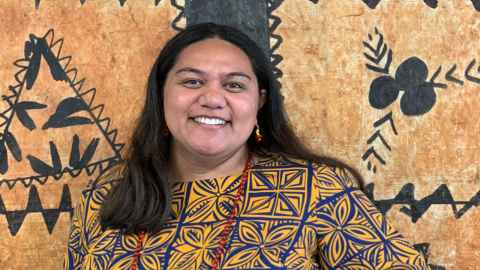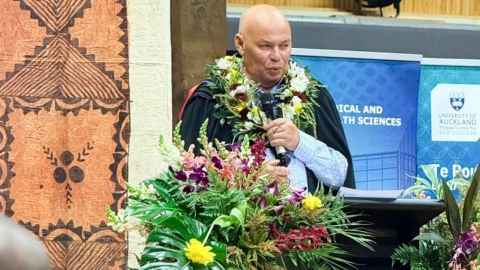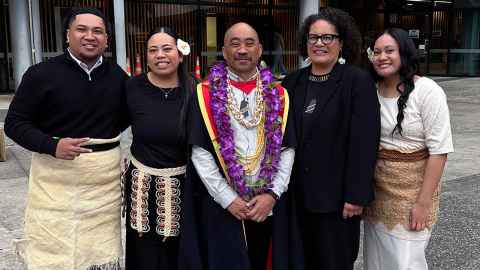Celebrate Faahi Tapu he Vagahau Niue, Niue Language Week 19 - 25 Oct
17 October 2025
Doctoral candidate Dantzel Rose Tiakia is among the 30,000 Niueans that call Aotearoa, New Zealand home.

Aotearoa New Zealand prepares to celebrate Niue Language Week 19 – 25 October. This year’s theme is a powerful call to action: ‘Fakatapunu, Ofania, mo e Fakaaoga e Vagahau Niue! Elevate the language, cherish it as a taoga (treasure) and use it every day.’
Championing culture through research
Waipapa Taumata Rau, University of Auckland doctoral candidate Dantzel Rose Tiakia is among the 30,000 Niueans that call Aotearoa, New Zealand home.
“That’s something I love about our culture – we hold fono to make sure everyone’s voice is heard. In my family and village, that’s how we make decisions and I carry that same approach into my research.
“It’s about listening, being accountable, and making sure the work reflects the values and needs of the people it’s meant to serve.”
Dantzel’s connection to her culture runs through her whakapapa: Lakepa Maleloa (Niue), Ngāti Wai, Ngāti Rehua, Ngāti Wai ki Aotea (Māori) and her lived experiences.
Her doctoral research focuses on Fuata Niue (Niue youth) mental health, exploring how young Niueans define well-being and what influences their mental health.
“My cultural identity influences every part of my research,” she says. “I don’t just want to do research about my people — I want to do research with them and for them.”
The Collective Spirit of Niue
“One of the things I deeply cherish about my culture is the way we live collectively. Whenever there’s a significant event in the village, be it a funeral, wedding, huki teliga (ear-piercing ceremony), hifi ulu (hair-cutting ceremony), or an unveiling, the entire village comes together in support.”
She witnessed this with the unveiling ceremony of her aunty in Lakepa.
“I witnessed this spirit in action: some people gifted pigs to be prepared for the guests, others arrived as early as 3am to help prepare and put down the umu.”
It was a collective hands-on approach for almost all aspects of the ceremony.
“Men came to assist our family in pouring concrete for her grave and headstone, and many dropped off food to contribute to the feast. And this was just one occasion. I’ve seen this kind of generosity and unity, time and time again, and it’s something I truly love.”
Her first research trip to Niue reinforced these values. “Every home welcomed me warmly — offering food, drink, and gifts like kahoa fiti siale (frangipani necklaces) or fresh fish. Their hospitality taught me the true meaning of reciprocity and inspired me to honour their stories with integrity and care.”
For Dantzel, language and culture are inseparable from well-being. She brings these principles into her research methodology, ensuring community voices guide the process.
“We hold fono to make decisions collectively — I carry that same approach into my work. It’s about listening, being accountable, and making sure the research reflects the values and needs of the people it’s meant to serve.”
We hold fono to make decisions collectively — I carry that same approach into my work. It’s about listening, being accountable, and making sure the research reflects the values and needs of the people it’s meant to serve.

Sons of Niue: Academic Leadership
Niue representation at the University of Auckland is strong, this year alone witnessed renowned sons of Niue, Professor Sir Collin Tukuitonga and Professor Vili Nosa presenting Inaugural Lectures, marking the promotion to professorship.
Professor Sir Collin Tukuitonga
As Co-Director of Te Poutoko Ora a Kiwa and a leading voice in Pacific health, Professor Sir Collin Tukuitonga (Alofi) brings decades of expertise in public health, policy, and advocacy. His Inaugural Lecture in June explored the critical role of research in shaping equitable health systems and strengthening cultural identity.
Sir Collin has consistently championed Pacific-led solutions, ensuring that Indigenous knowledge informs policy and practice. A visionary leader, Sir Collin highlights how evidence-based strategies can elevate Vagahau Niue and improve outcomes for Niuean communities across Aotearoa and the Pacific.

Professor Vili Nosa
Professor Vili Nosa ( Avatele and Hakupu), a respected scholar in Pacific mental health and community well-being, shared insights on culturally grounded approaches to health research. His work emphasises the importance of understanding mental health through Indigenous frameworks and lived experiences, particularly within Pacific communities.
In his Inaugural lecture last month, Professor Nosa underscored how collaborative research and cultural responsiveness can transform health services and empower communities. His contribution reflects a commitment to ensuring that Pacific voices lead conversations about well-being, resilience, and identity.
Niue Knowledge Fono
Lalaga e tau Pulotu ma Niue Anoiha, Weaving knowledge for Niue’s future
Building on the strength of the Niue Research Symposium last year, the Niue Knowledge Fono, will be held 7 - 8 November at Fale Maama, Pasifika Medical Association Headquarters in Mt Wellington.
A cornerstone event for Niuean scholarship and leadership in Aotearoa, the Fono provides a platform for Niuean researchers, community leaders and policymakers to share insights and shape strategies for the future.
Professor Sir Collin Tukuitonga, Co-Director of Te Poutoko Ora a Kiwa will welcome this year’s opening address speakers: Hon. Prime Minister Dalton Tagelagi and Hon. Minister Sonya Talagi.
Sir Collin says their presence underscores the importance of research in informing policy and strengthening cultural identity. The Fono will spotlight projects that elevate Vagahau Niue, advance health and education outcomes, and ensure Niuean voices lead conversations about their own futures.
Register to attend in person or online
Date: 7 November 9am - 4pm | 8 November 9am - 1:30pm
Venue: Fale Maama, Pasifika Medical Association Headquarters
7a Pacific Rise, Mt Wellington.